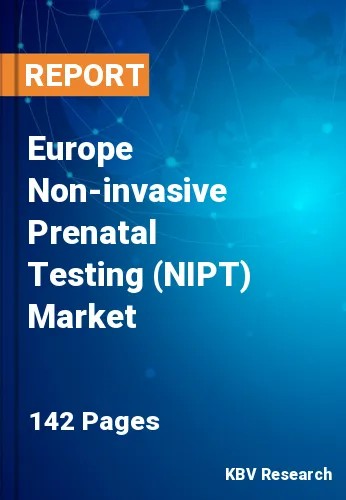The Europe Non-invasive Prenatal Testing (NIPT) Market would witness market growth of 17.7% CAGR during the forecast period (2023-2030).
NIPT can be carried out as early as 9–10 weeks into pregnancy, giving parents and medical professionals access to vital information about the unborn child's health earlier and facilitating early interventions. NIPT is not limited to a single disorder; it can detect a wide range of chromosomal abnormalities, including Down syndrome (Trisomy 21), Edwards syndrome (Trisomy 18), Patau syndrome (Trisomy 13), and sex chromosome disorders. The reduced false-positive rate of NIPT results in fewer unnecessary follow-up tests and the associated anxiety for expectant parents.
The growing understanding of the technology has contributed significantly to its adoption. NIPT is now more widely available and less expensive for a wider variety of pregnant women because many insurance companies fund it. Chromosome abnormalities such as Down, Edwards, Patau, and sex chromosome diseases are primarily detected via NIPT. By analyzing cell-free DNA from the foetus in the mother's bloodstream, NIPT accurately assesses the baby's chromosomal health. NIPT can accurately determine the sex of the foetus. This information is valuable for parents who wish to know the gender of their baby and for medical reasons, such as sex-linked genetic conditions.
Prenatal care in Europe has generally been well-established and accessible, focusing on ensuring the mother's and developing foetus’s health and well-being. According to the 2022 data from the National Health Service England, the NHS in England has announced that maternity services across England will receive a funding boost of £127 million, which will assist in providing safer and more individualized care for women and their newborns. Thus, an increase in the cases of Down’s syndrome in Europe and rising prenatal care investment will boost the demand for these in the region.
The Germany market dominated the Europe Non-invasive Prenatal Testing (NIPT) Market by Country in 2022 and would continue to be a dominant market till 2030; thereby, achieving a market value of $1,133.5 Million by 2030. The UK market is exhibiting a CAGR of 16.7% during (2023 - 2030). Additionally, The France market would experience a CAGR of 18.6% during (2023 - 2030).
Based on Product, the market is segmented into Consumables & Reagents, and Instruments. Based on Application, the market is segmented into Trisomy, Microdeletion Syndrome, and Others. Based on End User, the market is segmented into Diagnostic Laboratories, Hospitals & Clinics. Based on Technology, the market is segmented into Next Generation Sequencing (NGS), Microarray, Polymerase Chain Reaction (PCR), and Rolling Circular Amplification. Based on countries, the market is segmented into Germany, UK, France, Russia, Spain, Italy, and Rest of Europe.
Free Valuable Insights: The Global Non-invasive Prenatal Testing (NIPT) Market will Hit USD 17.7 Billion by 2030, at a CAGR of 18.1%
The market research report covers the analysis of key stake holders of the market. Key companies profiled in the report include Illumina, Inc., Natera Inc., F. Hoffmann-La Roche Ltd., PerkinElmer, Inc., Laboratory Corporation of America Holdings, Eurofins Scientific SE, Thermo Fisher Scientific, Inc., GE HealthCare Technologies, Inc., Agilent Technologies, Inc., and Pacific Biosciences of California, Inc.
By Product
By Application
By End User
By Technology
By Country
Our team of dedicated experts can provide you with attractive expansion opportunities for your business.

